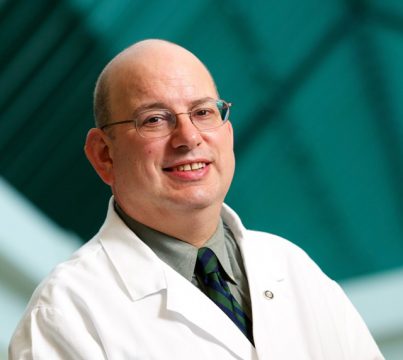Andrew Gettinger, MD, FAMIA, FCCM, FCCP, an emeritus professor of anesthesiology at Dartmouth’s Geisel School of Medicine, has received the 2022 Don Eugene Detmer Award for Health Policy Contributions in Informatics from the American Medical Informatics Association (AMIA).
Given each year at the AMIA’s national symposium, the prestigious award recognizes an individual that has made a significant singular contribution or series of contributions over the course of a career that exemplifies the expertise, passion, and spirit that Dr. Detmer—a leader in the field of informatics and past CEO of AMIA—has demonstrated for health policy.
The AMIA serves as a multidisciplinary, interprofessional home for over 5,000 informatics professionals, supporting them through education, training, accreditation, and certification. It provides members with professional growth opportunities, fosters collaboration and networking to support their work, and expands members’ leadership opportunities within the association and in the informatics field.

“I was delighted to hear I’d been chosen—I’m really touched by it,” says Gettinger, who during the most recent phase of his career served as chief clinical officer for the Office of the National Coordinator for Health in the U.S. Department of Health and Human Services (HHS).
“The award validates something that one of my mentors, Dr. Koop, told me a number of years ago when he said, ‘Andy, it’s time for you to branch out—your work at Dartmouth is great but you have more to offer.’ That allowed me to make contributions to medicine and healthcare in ways that I never would have been able to if he hadn’t nudged me in that direction.
“Another important mentor has been Don Detmer, one of the founders of informatics who continues to provide great insight into the field, and with whom I’ve developed a friendship over the years—it’s a real honor to receive an award that’s named after him.”
Trained as a critical care anesthesiologist, Gettinger spent the first phase of his career as a practicing physician, researcher, and teacher at Dartmouth-Hitchcock (DH) and Geisel, where he led the critical care service and was medical director of the multidisciplinary Intensive Care Unit at DH for 10 years.
Gettinger’s desire to foster improved clinical care and develop more evidence-based medicine prompted him to transition into the second phase of his career, clinical informatics. He became the chief medical informatics officer at DH, associate dean for clinical informatics at Geisel, and an adjunct professor of computer science at Dartmouth—leading the development of an electronic health record (EHR) system and serving as the physician lead through the organization’s adoption of a vendor-based EHR.
Following Dr. Koop’s advice, Gettinger began the third phase of his career in earnest in 2012, when he joined the late Senator Orin Hatch’s office as a Robert Wood Johnson Health Policy fellow. The following year, he was recruited to begin the first of a series of leadership roles, heading up HHS’s health information technology (IT) safety program in the Office of the National Coordinator for Health Information Technology (ONC).
In these roles, Gettinger worked to advance health information technology (IT) policy to improve safety of health IT, healthcare quality using health IT, and usability of health IT systems for clinicians. He served as an advocate for clinicians’ needs, while understanding the importance of informatics as a field and of working collaboratively with diverse groups of stakeholders to advance health policy.
Some of the accomplishments that Gettinger is most proud of during his time at the ONC include leading an effort to develop a road map to a health IT safety collaborative; co-leading with the Chief Medical Officer of the Centers for Medicare and Medicaid Services (CMS) a several-year initiative to identify ways to reduce clinician burden, which resulted in the first changes to CMS coding requirements since the late ‘90s; seeking redress for substandard and harmful electronic record systems; and leading the development of the ONC report to Congress on patient identification.
In recognition of these efforts and others, Gettinger’s work at ONC has been acknowledged with awards from the HHS and the Department of Justice, Civil Division.
In their nomination of Gettinger, Teresa Zayas Caban, PhD, FACMI, FAMIA, assistant director for policy development at the National Library of Medicine, and Thomas Payne, MD, FACP, FACMI, professor of biomedical informatics and medical education at the University of Washington School of Medicine, wrote: “Through his contributions, Dr. Gettinger has significantly advanced the health informatics and health IT policy agenda for more than two decades, leaving a substantial mark in the field.”
Asked what he has enjoyed most about his work in health policy, Gettinger says, “I’m of a generation where many of us didn’t do military service. So, I’ve had a very strong feeling that civic obligations are important, and that people should at some point in their life contribute to the better good. The window of time I spent in Washington fulfilled that for me—I’m very honored that I had an opportunity to serve.”
Gettinger received his AB from Dartmouth College in 1976 and his MD from Dartmouth Medical School in 1979. He trained at the Hartford Hospital, Boston Children’s Hospital, and Dartmouth-Hitchcock Medical Center in anesthesiology, pediatric anesthesiology, and critical care medicine and was a member of one of the first groups certified in clinical informatics by the American Board of Preventive Medicine.
Founded in 1797, the Geisel School of Medicine at Dartmouth strives to improve the lives of the communities it serves through excellence in learning, discovery, and healing. The Geisel School of Medicine is renowned for its leadership in medical education, healthcare policy and delivery science, biomedical research, global health, and in creating innovations that improve lives worldwide. As one of America’s leading medical schools, Dartmouth’s Geisel School of Medicine is committed to training new generations of diverse leaders who will help solve our most vexing challenges in healthcare.